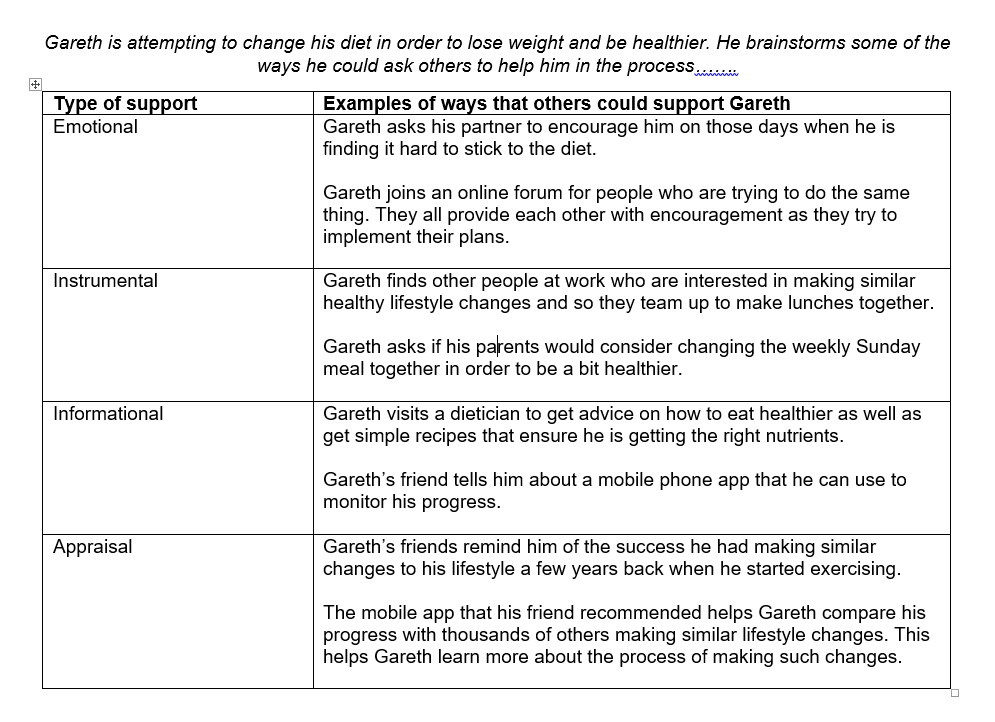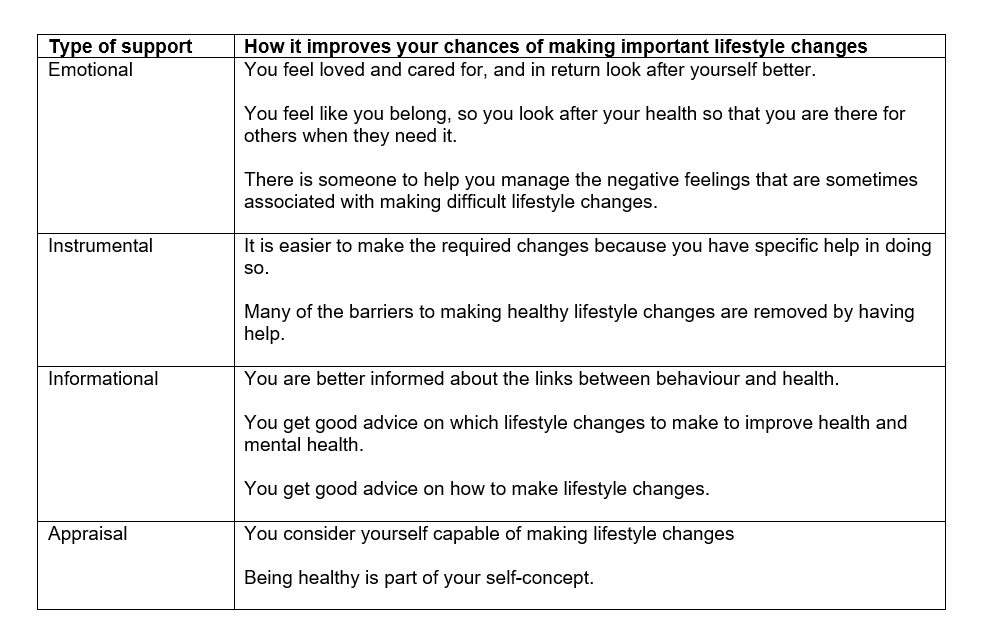
Welcome to Part 3 of Becoming a Behaviour Change Expert.
In this series I am looking at the skills you can develop, so you can become a master at making changes in your own life. Changes like getting more exercise, eating better, being more productive and looking after your general wellbeing.
I was inspired to write this series after realising that most of us want to make significant changes in our lives, but have never been specifically taught how to do it.
In Part 1 I looked at how to set goals, that is, how to plan your behaviour change. In Part 2, I looked at how to monitor your progress towards these goals.
In Part 3 I am looking at how to use social support to improve the chances of you making successful changes.
What do I mean by social support?
There are varied definitions of social support, but the one I think applies here is the perception that an individual has that they can access assistance from other people in their social network.
In this definition, social support is not measured objectively as the ‘number of friends’ a person has, but rather subjectively as whether a person feels they can access the support they need. I might only have a couple of close friends, but if I feel I can call on them for support when I need it, then my level of social support is high.
Types of social support
People provide support in a number of different ways.
Emotional support involves expressions of empathy, love, trust and caring. We most commonly get it from individuals close to us: partners, best friends, family members. Emotional support helps us feel cared for and that we have value and worth.
Instrumental support involves tangible acts of aid or service. It is when someone gives us a lift, lends us some money, babysits the kids, those kinds of things. Instrumental support helps us get things done, by removing barriers or filling gaps in our own abilities.
Informational support involves the provision of advice, suggestions and information. We commonly associate this with health professionals who provide facts and suggestions about appropriate treatments or ways to be healthy. Informational support helps us make better-informed decisions.
Finally, appraisal support involves someone integrating their knowledge of who we are and our situation to provide valuable reflections on how we might proceed with a particular goal or task. For example, a close friend might highlight past instances of successful behaviour change and how we could use that knowledge in the current situation. This type of support helps us to learn more about ourselves and our abilities, by providing a knowledgeable outsiders perspective.
People from whom to seek support
Whilst we might only have a few close friends and immediate family members, our social networks are often bigger than we think. They include friends, family members, fellow students or colleagues (work), helping professionals and even the occasional stranger. Also, in this day and age, many people belong to clubs or groups (e.g. sport teams, online forums) where they interact with people who don’t necessarily fall into the friend or colleague categories, but from whom support is often received.
Another source of social support that people do not always think about is the anonymised social support provided by groups connected through mobile and internet technologies. For example, on any day of the week you can visit the site https://www.patientslikeme.com/ and get high quality treatment information gained from aggregating aggregates data across thousands of individuals with different health conditions. Through technology you can gain the support of thousands of strangers to help you make better decisions.
The key is to match the support request to the person you are asking. Whilst you might not ask a colleague for help with a very personal emotional problem, you might ask them if they want to join you on a regular lunchtime walk, in order to get fit. Similarly, you wouldn’t ask a close friend who knew nothing about medicine, for medical advice, but you would ask a health professional.
The different ways people can help you make important behaviour changes
When making positive lifestyle changes, there are many ways you can ask someone to help you. Let’s take the example of ‘changing your diet’ and consider the different types of assistance you could seek.

The art of asking for help
I’m terrible at asking for help. I admit it. I usually wait until everything has fallen apart and I am surrounded by chaos, before meekly asking for assistance. So this is definitely a case of do what I say, not what I do.
There are many reasons why a person might not ask for support:
- They don’t know who to ask
- They aren’t sure what kind of help they need
- They think they should be able to cope on their own
- They think people won’t want to help
- They are worried about being judged or criticised
- They are worried that everyone is too busy or stressed to help them
- They are embarrassed to ask
You’ll note that a lot of them include worries and negative thoughts that the individual needing help has about other people. The thing is we greatly underestimate how willing and able people are to help us. We tell ourselves they a) are too busy, b) don’t care, c) have too much of their own stuff going on, or d) will criticise or belittle us. And yes, it is possible that might happen but it is far more likely that they will want to help. They might not necessarily do a great job, or they might miss the mark, but I’ve learned that most people (even if they are having a rough time themselves) enjoy the feeling of being able to help someone. Don’t assume that your mind is telling you accurate things about how helpful people will be.
The second thing you’ll note about the list of reasons why people don’t seek support is many of them are related to confusion about “who to ask for what”. In some cases this reflects actual social isolation; people who don’t have anyone to ask for help. In those cases, a good starting point is online and telephone services (e.g. Lifeline, 7cups, support forums).
Often however it relates more to a lack of clarity about what kind of support you need. Here’s a simple tip. People find it easier to help when you tell them what help you need and why.
“hey dad, can I borrow $200 so I can fix the heater in the lounge room?”
“hey buddy, would you be able to give me a lift home from the party, because my car is being fixed”
“hey honey, would you come with me to the medical appointment, because I am nervous about getting the test results”
{What I need and why}
The other important thing to consider here is the extent to which you provide support for other people. The provision of social support is a reciprocal process. If you make effort to help others, they will make effort to help you.
Does having social support improve your chances of making important lifestyle changes?
Social support is reliably related to health and mental health. Those who report greater social support show reduced mortality and morbidity.
One explanation for why this is the case is that those with social support engage in more healthy behaviours, and less unhealthy behaviours.
To think about how this works, consider the different types of support and the effects they might have on someone trying to make positive lifestyle changes.

Takeaway messages
You don’t have to make important lifestyle changes all on your own.
The likelihood of successfully making such changes goals increases with the more support you receive.
Most people are happy and willing to help you, especially if you are clear about the help you need, and are also willing to help them in return.
There are different types of support that people can provide. Think about how the support you are requesting is matched to the person you are asking.

